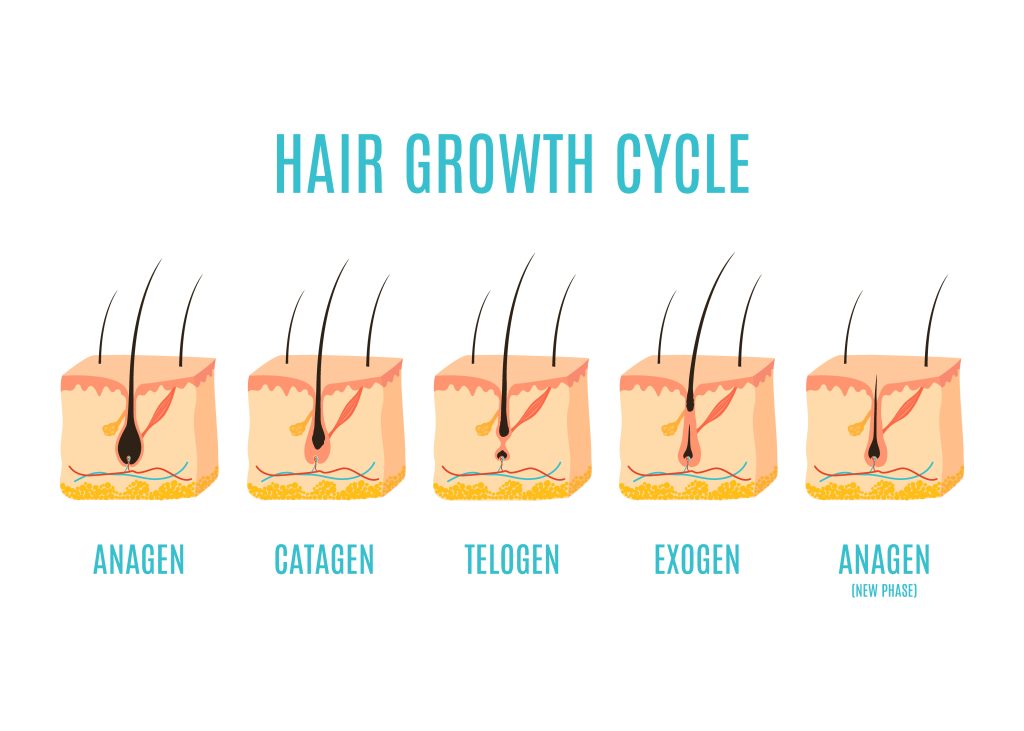-By Maddy Crowley, Hair Technician
Physicals, well-checks and routine appointments have been a part of our lives since before entering the world. Beginning with prenatal visits, then quarterly exams, until we finally hit the 2-year mark, where we are sent off with a sticker, a lollipop and an entire year off from the doctor’s office.
However, many people are affected by chronic illnesses or are genetically predisposed to certain conditions which require the attention of specialized physicians. These ailments often require the use of medications to effectively treat them, and unfortunately some of these medications may cause hair loss. But, by taking the initiative through self-advocacy, research and early intervention, you can significantly lower the risk of medication-induced hair loss.
Understanding Medication-Induced Hair Loss
Medication-induced hair loss, also known as drug-induced alopecia, is a condition in which the use of certain medications triggers hair thinning or hair loss. It is essential to remember that not all medications cause this side effect, and its severity can vary from person to person. Hair loss typically occurs in two main forms:
- Telogen Effluvium: This type of hair loss occurs when medications disrupt the normal growth cycle of hair follicles. The affected hairs enter the resting phase (telogen) prematurely and then fall out. This can result in diffuse hair thinning rather than bald patches.
- Anagen Effluvium: Some medications can directly damage the hair follicles during their active growth phase (anagen), causing hair to fall out rapidly. This type of hair loss often leads to more noticeable bald patches.

Keeping an Eye on Hair Changes
Though it may take months, even years, to see the drastic effects several prescription medications have on the hair cycle, there are tell-tale signs to look for in an effort to ensure early intervention before the hair is permanently affected. The best way to ensure hair heath is to keep a watchful eye on the amount of hair lost each day (generally up to 100 strands is within normal range), and notice changes in hair texture, luster, and growth. All of these characteristics make up the ways in which medication may be impacting or impeding the hair cycle.
Scalp health is equally important as the scalp provides a nutrient-rich bed for hair to grow. If the scalp becomes irritated or inflamed, hair follicles will become damaged which leads to advanced aging, thinning hair, and breakage. This destroys the nutrient-rich supply these follicles once flourished in, causing scarring and recession. Noting any redness, flaking, or pain on the scalp is important for early detection.
Common Medications Associated with Hair Loss
As humans, it is our natural response to bombard physicians with questions upon questions when being prescribed a new medication, many of which are derived out of concern for our physical appearance.
“Does this prescription suppress my appetite?”
“Will I gain weight?”
“Is acne or skin irritation a common side effect?”
The list goes on, though patients are often so consumed by the idea of weight gain, that hair loss is put on the back burner. Some of the medications that may contribute to hair loss include:
- Anticonvulsants like Keppra and Tridione
- Beta-blockers (Lopressor)
- Anticoagulants (Heparin), statins (Zocor)
- Immunosuppressants (Methotrexate)
- Antidepressants (Zoloft)
- Acne medications (Accutane)
- Gout medications (Zyloprim)
- Chemotherapy drugs
- Antifungals
- Antibiotics
- Hormone replacement therapies (for post-hysterectomy or post-menopausal use)
- Contraceptive pills
- Anabolic steroid use
Although a vast majority of medications have hair loss listed as a potential side effect, this list is not to steer you away from using these vital medications. However, we encourage patients who are taking any of these medications to have a conversation with their doctor about the possible side effects to their hair health.
Options for Managing Hair Loss
Experiencing medication-induced hair loss can be emotionally challenging, but there are several strategies that can help you cope:
- Consult your healthcare provider: If you suspect that your medication is causing hair loss, talk to your doctor. They can assess your condition, consider alternative medications, or adjust your current medication.
- Be patient: In many cases, hair loss due to medication is temporary. Once the offending medication is stopped or switched, your hair may gradually regrow. If a change in medication is not an option, there are treatments to address hair loss.
- Use hair care products wisely: Choose gentle shampoos and conditioners and avoid excessive heat styling or harsh hair treatments that can further damage your hair.
- Seek support: Hair loss does not have to be a permanent part of your life. Consulting a hair restoration surgeon for nonsurgical and surgical options is a great first step to combating hair thinning and loss.
Medication-induced hair loss is a side effect that can be distressing, but with the right support and strategies, you can manage it effectively. Begin your early intervention journey to prevention of medication-derived hair loss with the Quatela Center for Hair Restoration! To learn more about our treatment offerings and for a personal consultation, contact us online or call 585.244.0323.

Leave a Reply